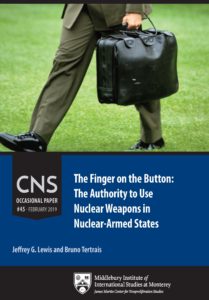February 18, 2019
by Jeffrey G. Lewis and Bruno Tertrais
 The debate about the personality of Donald J. Trump has shed new light on an old question: how much of the terrible responsibility to inflict large-scale nuclear destruction should nuclear-armed countries invest in a single person?
The debate about the personality of Donald J. Trump has shed new light on an old question: how much of the terrible responsibility to inflict large-scale nuclear destruction should nuclear-armed countries invest in a single person?
The terms of this debate are well known and relate to the specific requirements of nuclear deterrence. On the one hand, there is a broad desire to retain political control and put in place measures to ensure there is never accidental or unauthorized nuclear use. On the other hand, the credibility of deterrence is thought to rest on the ability to always launch if and when decided, even in demanding cases such as a surprise attack. These twin goals are in tension, a situation that Peter Feaver terms the “always/never” dilemma.
Each nuclear-armed state has struck a slightly different balance between these measures, a balance that differs both among the nuclear-weapon states as well as within those states over time. While the “two-person rule” is common throughout the chain of command, several nuclear-armed countries choose to concentrate the legal authority to order the use of nuclear weapons in the hands of a single political leader. It is important to note that authority is not the same thing as ability—in most, if not all, nuclear-armed countries, the legal authority to order the use of nuclear weapons is held at a much higher level than is the actual ability to launch those weapons. Effectively, the two-person rule divides the ability to carry out the action among multiple persons, thus increasing the likelihood that nuclear weapons will only be used on the order of the appropriate authority. The election of Donald Trump has renewed debate over the wisdom of this arrangement.
The issue is not merely about President Trump. Many nuclear-armed states are expanding the number and types of nuclear weapons they possess, introducing systems that alter the requirements for command and control. (Several new countries are deploying or play to deploy sea-based nuclear capabilities, including India, Pakistan, North Korea, and possibly Israel.) New developments in technology can improve the security of nuclear command and control (encryption, communications, etc.) while also introducing new vulnerabilities.
Few studies have detailed the procedures that govern the use of nuclear weapons in all nuclear-armed countries in a comparative way. Indeed, since a report to the US House of Representatives in 1975, almost no publications have been devoted to this subject, a rare exception being a short though valuable 2017 Union of Concerned Scientists report.
CNS Occasional Paper #45 seeks to address sets of questions for each of the nine known nuclear-weapon possessors:
(1) Who has the legal authority to use nuclear weapons and on what grounds?
(2) How would the decision to use nuclear weapons be taken and how would that decision, in the form of an order, be transmitted? What are the procedures designed to ensure political control? Have any states pre-delegated the authority to use nuclear weapons under specified, extreme circumstances?
(3) What would happen if the legitimate authority was incapacitated (“devolution procedures”)?
About the authors
Jeffrey Lewis is the director of the East Asia Nonproliferation Program at the James Martin Center for Nonproliferation Studies (CNS) at the Middlebury Institute of International Studies at Monterey. Previously, he has served as the director of the Nuclear Strategy and Nonproliferation Initiative at the New America Foundation, executive director of the Managing the Atom Project at the Belfer Center for Science and International Affairs, executive director of the Association of Professional Schools of International Affairs, a visiting fellow at the Center for Strategic and International Studies, and a desk officer in the Office of the Undersecretary of Defense for Policy. The work of his team at Middlebury was recently covered in the New York Times, Wall Street Journal, the Washington Post, and VICE. He is the author of Minimum Means of Reprisal: China’s Search for Security in the Nuclear Age (MIT Press, 2007) and Paper Tigers: China’s Nuclear Posture (IISS, 2014). He is a regular columnist for Foreign Policy, and has published articles in Foreign Affairs, the Washington Post, and the New York Times. He is the founder of ArmsControlWonk.com, the leading blog and podcast on disarmament, arms control and nonproliferation.
Bruno Tertrais is the deputy director at the Fondation pour la recherche stratégique. He was a special assistant to the director of strategic affairs at the French Ministry of Defense between 1993–2001, a visiting fellow at RAND Corporation during 1995–96, and the director of the Civilian Affairs Committee at the NATO Parliamentary Assembly between 1990–92. He was a member of the Commissions on the White Paper on Defense and Security appointed by Presidents Sarkozy (2008) and Hollande (2012). Dr. Tertrais is also a member of the editorial board of the Washington Quarterly, Strategic and Military Affairs, and a contributing editor for Survival. He is the author, among other books, of: War Without End (The New Press, 2005); and, along with Jean Guisnel, Le Président et la Bombe: Jupiter à l’Elysee (Editions Odile Jacob, 2016), which was awarded the Prix du livre géopolitique de l’année in 2016. He has published widely on international relations and geopolitics, conflicts, US strategy, transatlantic relations, security in the Middle East, security in Asia, nuclear proliferation, nuclear deterrence, and military strategy.
